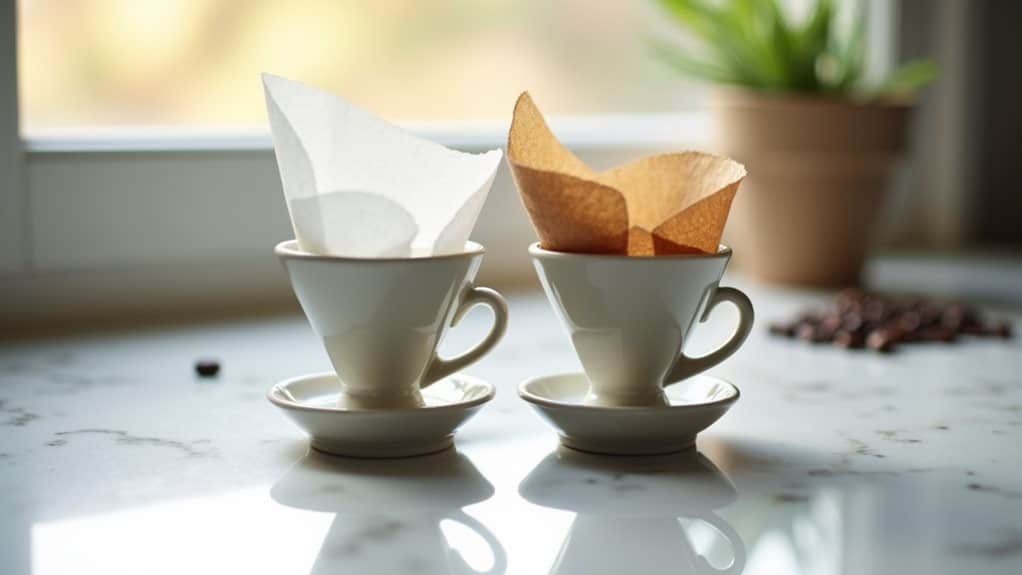When choosing between brown and white coffee filters, you'll need to weigh several key factors. Brown filters are more environmentally friendly due to minimal processing and no bleaching chemicals, making them a better choice for eco-conscious coffee drinkers. They're also thicker and more tear-resistant. White filters, however, typically produce a cleaner-tasting brew without papery notes and are more widely available at lower prices. While both options effectively filter coffee and trap harmful compounds, brown filters offer better environmental benefits, and white filters provide superior taste. Your final choice depends on whether you prioritize sustainability or flavor in your daily coffee routine.
Quick Guide
- Brown filters are more environmentally friendly due to minimal processing and faster biodegradation, while white filters require chemical bleaching.
- White filters produce cleaner-tasting coffee without paper flavors, whereas brown filters may impart slight papery notes.
- Brown filters are generally safer for health, containing fewer chemical residues from processing compared to bleached white filters.
- White filters are typically cheaper and more widely available in stores, making them a more accessible choice for consumers.
- Brown filters are more durable due to less processing, but both types effectively filter coffee and trap cholesterol-raising compounds.
Processing Methods
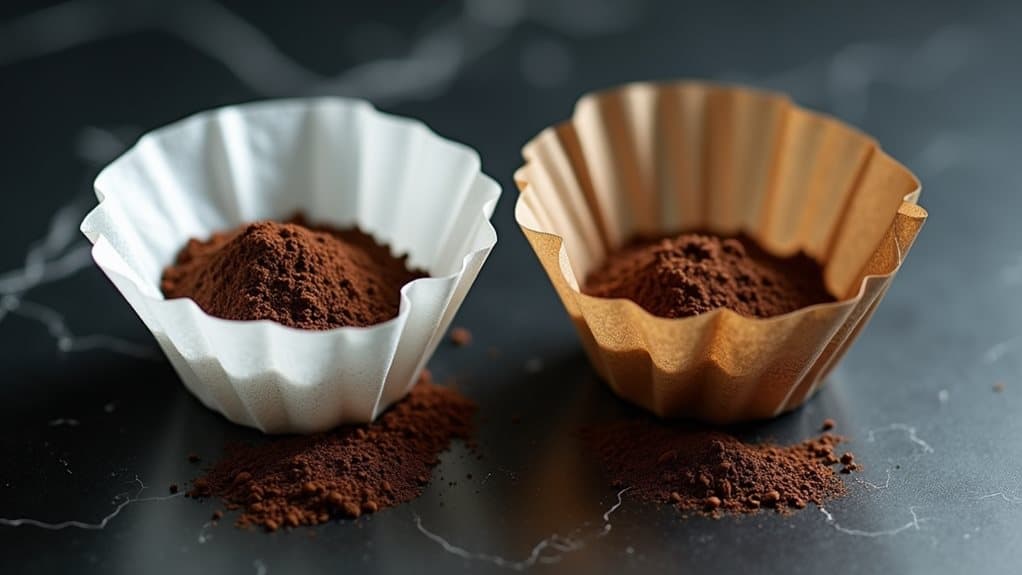
Both brown and white coffee filters begin their expedition as cellulose fiber from pine and spruce trees, but their paths quickly separate during manufacturing.
Brown filters maintain their natural color through minimal processing, while white filters undergo additional bleaching with either chlorine or oxygen.
You'll find brown filters are typically thicker and more tear-resistant, as they're less processed. The oxygen bleaching process produces significantly less environmental waste compared to chlorine bleaching methods.
White filters, though more processed, are widely available and often cost less.
Environmental Footprint
When you're choosing between brown and white coffee filters, you'll find that brown filters leave a markedly lighter environmental footprint due to their minimal processing and absence of bleaching chemicals.
While both types are biodegradable, brown filters break down more efficiently in compost bins and require fewer resources during manufacturing. Considering that coffee preparation methods generate 1.6 kg CO2e per cup, choosing eco-friendly filters becomes even more important.
Your choice of brown filters helps conserve water and energy while reducing harmful chemical discharge into the environment, making them a more eco-conscious option for your daily brew.
Processing and Chemical Impact
Two key differences between brown and white coffee filters lie in their processing methods and environmental impact.
White filters undergo extensive bleaching with chlorine or oxygen, requiring more energy and chemicals that can harm ecosystems.
In contrast, brown filters retain their natural state without bleaching, resulting in less processing, zero chemical usage, and a considerably lower environmental footprint. Both types of filters require approximately one tablespoon of water per cup when brewing coffee.
Biodegradability Comparison
Understanding the biodegradability differences between brown and white coffee filters reveals significant environmental implications.
Brown filters decompose faster in 6-8 months due to their unbleached composition, enhancing your compost with nutrients.
White filters, containing bleaching agents, can take longer to break down and may introduce chemicals into your compost pile. They'll also contribute more to methane production in landfills.
Resource Conservation Benefits
Through careful analysis of resource conservation, brown coffee filters emerge as the clear environmental winner over their white counterparts.
You'll find that brown filters require less processing time, water, and energy during manufacturing. They don't need bleaching chemicals, which means fewer toxic compounds entering our ecosystems.
Health and Safety Considerations
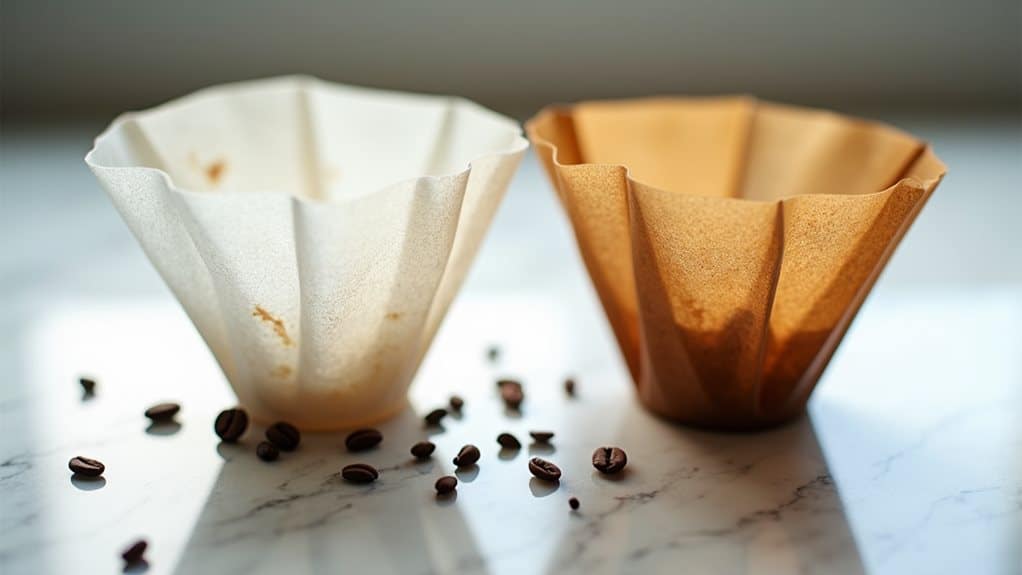
When you're choosing between white and brown coffee filters, you'll need to take into account the potential health impacts of chemical exposure.
White filters contain trace amounts of dioxin from bleaching processes, while unbleached brown filters help you avoid these chemical residues.
Your choice between the two types also affects how effectively diterpenes are filtered from your coffee, with both varieties capable of trapping these cholesterol-raising compounds, though paper filters generally work better than cloth or permanent alternatives.
Chemical Exposure Risks
Recent studies examining coffee filter safety have raised concerns about potential chemical exposure risks from both brown and white varieties.
You'll find PFAS "forever chemicals" in some filters, which can affect your immune system and metabolism.
White filters may contain bleaching residues, while both types can potentially expose you to manufacturing chemicals like formaldehyde, particularly from less reputable sources.
Natural vs. Processed Safety
Choosing between natural brown and processed white coffee filters involves more than just aesthetic preferences – it's a matter of health and safety considerations.
While brown filters offer a chemical-free option that appeals to health-conscious consumers, modern white filters are now produced using safer bleaching methods that pose minimal health risks.
You'll be safe using either type, though brown filters remain the preferred choice for those seeking all-natural alternatives.
Coffee Taste and Flavor
Although both white and brown coffee filters serve the same basic function, they can greatly impact your coffee's taste and flavor profile.
Brown filters tend to impart a slight papery taste and more bitter aftertaste, which you can minimize by rinsing before use.
White filters, thanks to the bleaching process, typically produce a cleaner, more neutral-tasting coffee without unwanted paper flavors.
Durability and Performance
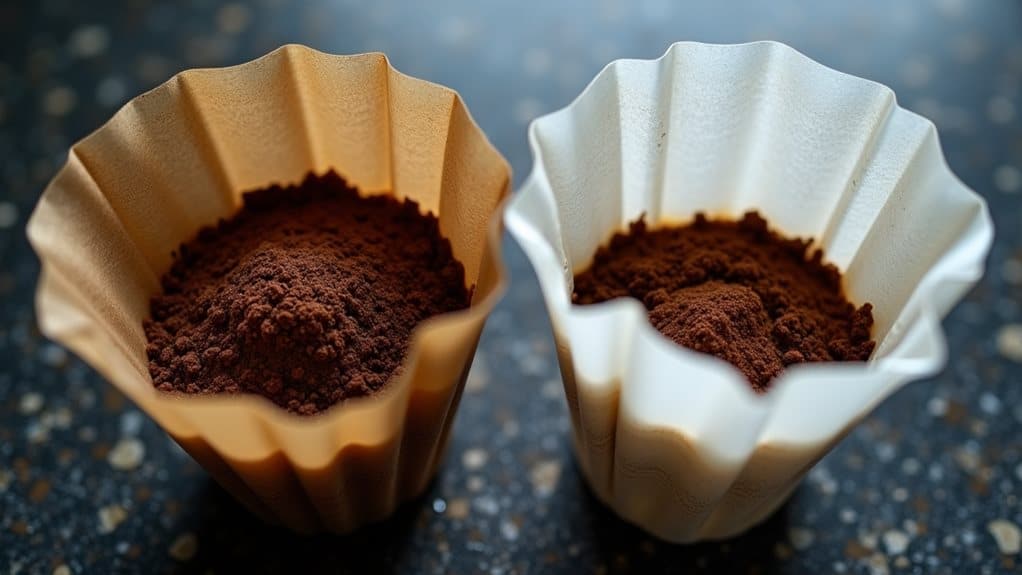
When it comes to durability and performance, brown and white coffee filters exhibit notable differences in their structural integrity and brewing capabilities.
You'll find that brown filters are generally more durable due to their unbleached nature and stronger fiber structure.
While white filters offer faster flow rates and clearer brews, they're more prone to tearing and may introduce bleaching chemicals into your coffee.
Cost and Availability
Price points and retail accessibility create notable differences between brown and white coffee filters in today's market.
You'll find brown filters are generally more expensive, costing between $3.79 to $6.99 per 100-count pack, while white filters cost just pennies per unit.
Though both options are widely available in stores and online, white filters tend to be more consistently stocked and priced across retailers.
Brewing Method Compatibility
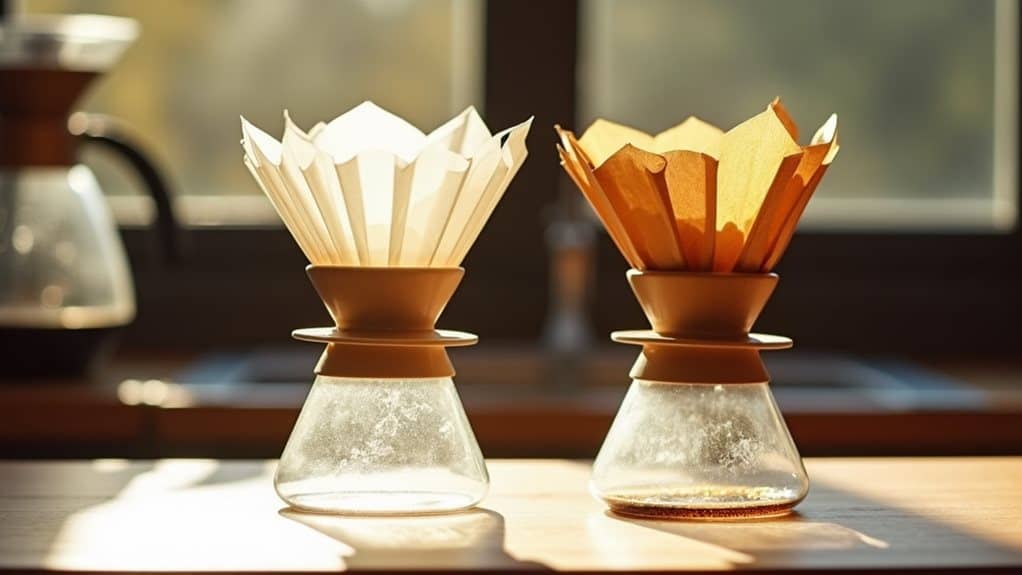
Different brewing methods often require specific filter considerations to achieve ideal results.
While brown filters excel in pour-over methods like the V60, offering better oil retention and fuller body, white filters are typically preferred for drip machines due to their neutral taste.
You'll want to rinse brown filters before use to eliminate any papery taste, regardless of your brewing method.
Maintenance and Storage
Proper care of your coffee filters, whether brown or white, plays an essential role in maintaining their functionality and ensuring ideal brewing results.
You'll need to store both types in dry, well-ventilated areas and protect them from dust using filter holders.
While brown filters require more pre-rinsing to prevent papery taste, white filters need gentler handling due to their higher susceptibility to tears.
Wrapping Up
When choosing between brown and white coffee filters, you'll find that both options have their merits. Brown filters offer environmental benefits and a more natural production process, while white filters provide consistent performance and clarity in taste. Your choice should align with your priorities – whether they're environmental impact, flavor purity, or cost efficiency. Consider your brewing method and personal preferences to make the best selection for your daily coffee routine.

